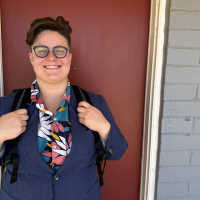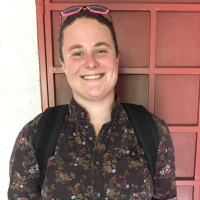Bio and Society Grad to Begin Bioethics Position at National Institutes of Health
By: Matt Tontonoz
Liz Dietz graduated from ASU in 2023 with a PhD in Biology and Society (Bioethics, Policy, and Law track). Their dissertation examined the politics of abortion, disability, and informed consent. In particular, they looked at how the practice of informed consent has become so ubiquitous, so seemingly necessary, that it is treated as a kind of social fact—rather than as something that itself is the vehicle for exercising an extraordinary amount of power.
Liz recently accepted a position at the National Institutes of Health, focusing on bioethics as it pertains to disability rights and LGBTQ issues. I spoke with them in August 2023 to find out more about the position and about how their approach to bioethics differs from more conventional approaches.
Congratulations on the new job! Tell me about your position.
Thanks. I will be a postdoctoral fellow at the National Human Genome Research Institute (NHGRI), which is part of the National Institutes of Health (NIH) in Bethesda, Maryland. I’m joining a history of genomics program that is located within the office of communications at NHGRI. My primary mentor, Christopher Donohue, is a historian of eugenics—which is a fascinating sort of person to have located in the Office of Communications. The program has this sort of “let us reckon with the past” flare to it, but with the backing and legitimacy of the NIH. And since the program is located within a communications department, there will also be a focus on thinking about how to communicate and translate my research to the public. I think part of my job will be to convene discussion groups across NIH about the biology of sex and the legacy of disability and eugenics.
How did the job come about?
It came about because last summer I submitted an abstract to a conference at the NHGRI. The conference was on disability and eugenics, and I thought it looked interesting. I wasn’t confident that I would be accepted, but I decided to send the abstract anyway.
As luck would have it, I got accepted to the symposium and gave a talk there. Part of participating in the symposium was the opportunity to publish a longer version of the talk, which gave me a ready-made outlet for one of my dissertation chapters. It ended up being an incredibly cool opportunity where I got to be on a panel with some amazing scholars. In particular, the organizers were really interesting and kind. If there’s one thing my time at ASU has taught me, it’s that you should only work with people who are kind and interesting. One of Christopher’s projects (he was one of the organizers) is a history of autonomy and personhood. This is intimately related to my dissertation work. So we set up call and it was just one of those conversations that felt easy and interesting and I was like, great, maybe we can write a paper together at some point.
Then a couple weeks later I got this very strange email where he said, “Hey, can you talk tomorrow? I might have a job for you.” It turned out that he had been trying to find somebody who could do the kinds of the things that I do, someone who could do trans bioethics-meets-disability bioethics.
Thank God you sent that abstract!
I know, it's such a butterfly flapping its wings thing.
What brought you to ASU originally?
I worked at a bioethics research institute called the Hastings Center before I came to grad school, so I was already a little bit involved with academic bioethics. One of the things that sold me on coming was I had read a piece that ASU’s Ben Hurlbut had written in the Hasting Center Report. He had such a clear and interesting take and I thought, “I’d like to learn to write and think like this person.” When I interviewed with him, most of our conversation was about bioethics pedagogy and what it’s like to teach bioethics to undergraduates in a life science program. One of the things that was intriguing to me about working with Ben and being in the Center for Biology and Society was getting to do bioethics, but in a way that is kind of skeptical of it as well. So it made a lot of sense for me to pursue science and technology studies (STS) coursework and bring that perspective to bioethics.
How does your take on bioethics differ from what other people mean when they use that term?
One of the cool things about this job for me personally is that I am going to be jointly appointed between the history of genomics program and the bioethics core within NHGRI, so I’ll get to do a mix of work focused specifically on the social implications of genomics research, and on foundational questions in bioethics itself, related to my work on autonomy and informed consent. I'll be co-mentored by Christopher Donohue and Sara Hull, who is in the bioethics core.
I told both of them in my interview a bunch of times that I am not a traditional bioethicist—that I am interested in an approach to bioethics where we treat the field as an object of study rather than just a thing that we're doing. And they said “that’s kind of what we want.”
But I don’t think that’s particularly unique: I think that a lot of the current generation of trainees in bioethics is pretty interested in being interrogative towards the field. American bioethics has historically taken a highly principlist approach, which in part reflects the role that philosophers had in shaping the field and in part how it has long been a kind of adjunct to clinical work. So a lot of answers to bioethical questions come from a set of rules—or a set of principles (autonomy, beneficence, non-maleficence, and justice, to be precise). But much of what I, and lots of other people working towards various kinds of questions about justice in today’s messy and unequal world, am interested in is in seeing how solving problems using the existing bioethical rules can be more limiting than liberating.
Keisha Ray’s approach has helped shaped the approach I’d like to take. Part of her research program is invested in developing what she (and others) call a “Black Bioethics.” Essentially, they argue that bioethics urgently needs to attend to the concerns of Black people and people of color. But that these needs aren’t, ultimately, exceptional. In other words, there ought not ultimately be a silo within the field that is uniquely focused on the concerns of racialized minorities: the field itself should develop the range to make those concerns central, because it will make the field both more robust and more just. I think a similar logic ought to apply to how we think about matters related to gender and transgender people. They have been made uniquely vulnerable through various pathways of structural disenfranchisement, but as people they aren’t terribly aberrant or exceptional. An ethics that works toward more just outcomes for them is an ethics that works toward justice broadly. I think the upshot of this, sort of the quiet part, is that we shouldn't need to have a Black bioethics, we shouldn't need to have a trans bioethics, because bioethics ought to be attentive to these things. But you have to name them first before you can declare that it was obvious all along. I'm interested in being of bioethics in order to reshape what bioethics is about.
And there’s a bunch of ways I’ll work toward that. This position will let me have all sorts of new conversations with the people who shape what we understand “scientific facts” about gender and disability to be, and the people who translate those facts into outcomes for people. And I’ll keep teaching! Teaching bioethics at ASU—a place that is diverse in some of the most meaningful senses of the term, and which forces us to figure out, meaningfully, how we ought to get along in a society that we hope remains democratic—has been foundational to my development as a scholar and a teacher. So I look forward to continuing to teach online bioethics at ASU where my students and I will get to continue to grow in those ways!

